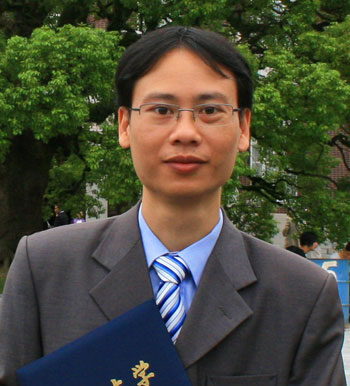The leading magazine published by Vietnamese people
Two prestigious scientific journals Science and Nature have published genetic studies of young Vietnamese doctor Tran Huy Thinh, due to the breakthrough findings of these studies.
The study of gene Programmed cell death-1 (PD-1) , also known as the gene " programmed cell death , " by Dr. Tran Huy Thinh, postdoctoral researcher at the Institute of Research RIKEN, Japan, was published in Science magazine.
PD-1 is a gene that plays an important role in the immune system and intestinal bacteria."Previous scientific groups have only studied the phenomenon but have not yet discovered the mechanism of PD-1. They have never studied the intestinal system and have not found the relationship between PD-1 and the change. of bacteria, " said Dr. Thinh.
Dr. Thinh's team pointed out that, when the function is lost, the gene PD-1 will cause an imbalance in the digestive system of the digestive tract. Specifically, beneficial bacteria such as Lactobacillus or Bifidobacteria do not exist or fall to very low levels. In contrast, harmful bacteria such as E. coli or Clostridium are 40 to 400 times higher than normal.
This situation affects the functioning of the gastrointestinal tract as well as the absorption of food, since antibodies in the human body are not properly screened, producing "autoantibodies" to counteract organs in the human body, causing autoimmune diseases such as systemic Lupus erythematosus, congenital cardiomyopathy. It also increases the risk and frequency of diabetes.

Dr. Tran Huy Thinh. (Photos provided by characters)
Thus, PD-1 can alter bacteria in the intestine, reduce beneficial bacteria, increase harmful bacteria, affect food absorption and human digestion. This is the first time the study of the mechanism of the production of self-autoimmune pathogens has been published. Therefore, it makes sense to develop new treatments to maintain the stability of the gastrointestinal bacterial system, control the production of autoantibodies to prevent and treat the Autoimmune pathology.
Earlier in 2010, Dr. Thinh's research on ene Activation induced-cytidine deaminase (AID) appeared in another prestigious journal, Nature. AID gene plays a decisive role in the super-mutation process, because it can cause chromosomal transitions to accumulate mutations and cause cancerous cell healing.
The study is highly appreciated because if the AID activity is understood, scientists can create drugs, inhibitors or activators of this signaling pathway to control the function of the AID gene. If successful, it is one of the new ways to prevent the progression of cancer, a problem that is becoming hot and global.
The Nature and Science magazine often publishes research in most areas such as natural sciences, social sciences and the universe. All works must ensure breakthrough criteria, open a new research direction or serve human society.
After the researchers submit articles to these two journals, the editorial board will thoroughly review them. Usually about 80% of the buildings they receive will be rejected. Subsequently, the articles were also sent to the world's leading experts in the same field to criticize securely. In the end, only about 8-9% of the buildings were selected for publication. The works must be supplemented, edited according to the experts' suggestions and at the request of the editorial board before being published in magazines.
According to experts, people with articles in Nature and Science often have the opportunity to receive high awards in science. " The works that appear in those two journals are considered the most valuable scientific achievements among millions of researches in all annual scientific journals," said Professor Pham Duy Hien, an expert. gas and nuclear, said.
Dr. Tran Huy Thinh was born in 1978, graduated from Hanoi Medical University in 2011. During the period from 2004 to March 2009, he studied for a PhD at Kyoto University. Since April 2009, he has been a postdoctoral researcher at RIKEN Research Institute in Japan. He plans to return to Vietnam to work. According to the young doctor, seriousness and passion in research will bring very proud results.
- Vietnamese people have research in the world's leading magazines
- 33-year-old doctor named alone in the leading physics magazine
- Three Vietnamese scientists have works in the first-class international physics magazine
- Featured Vietnamese portrait nearly 100 years ago
- The world's leading medical magazine published the Vietnam IVF study
- Vietnamese tea flowers are recognized by the world as new species
- Two Vietnamese scientists in top 100 Asia
- A beautiful set of photos about Vietnamese peoples in American newspapers
- Vietnamese netizens are about to 'use' Vietnamese MSN
- What makes a good leader?
- Discovered new lizards in Phu Yen
- 100 leading intellectuals of the world public
 The most famous scientific failures in history
The most famous scientific failures in history Mysterious genius mechanic and the machine froze time
Mysterious genius mechanic and the machine froze time The son carries the 'bad gene' of genius Albert Einstein
The son carries the 'bad gene' of genius Albert Einstein Isaac Newton
Isaac Newton